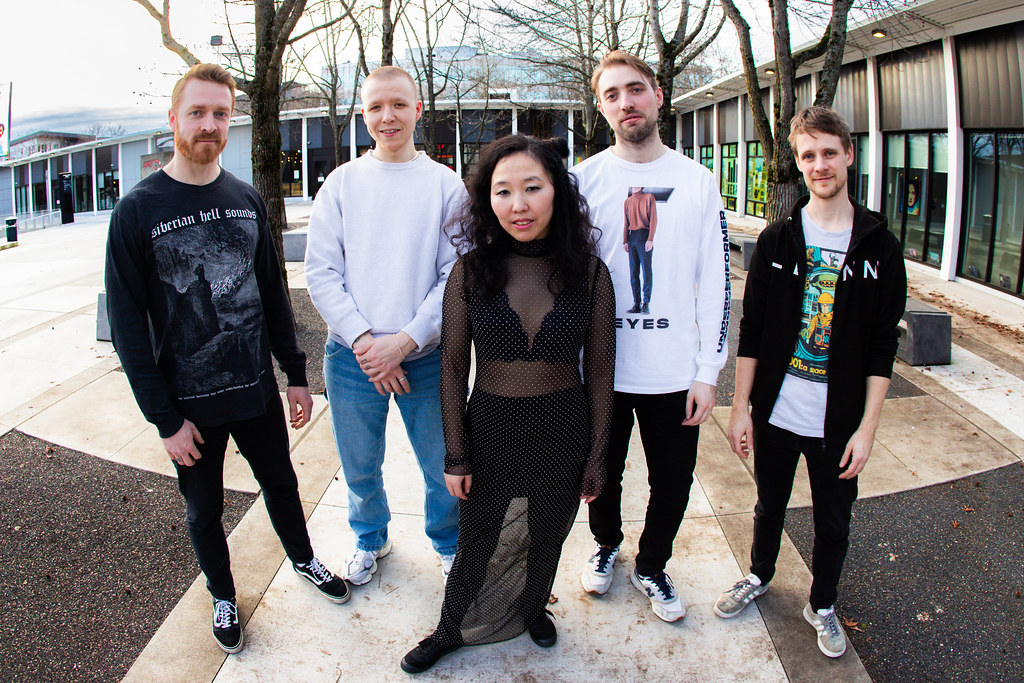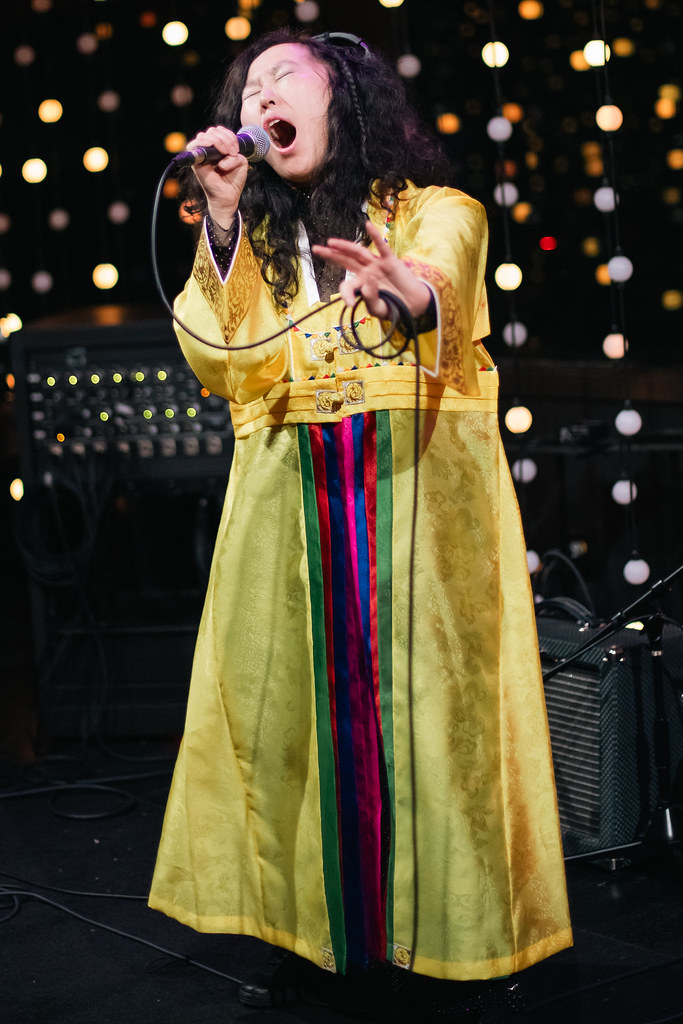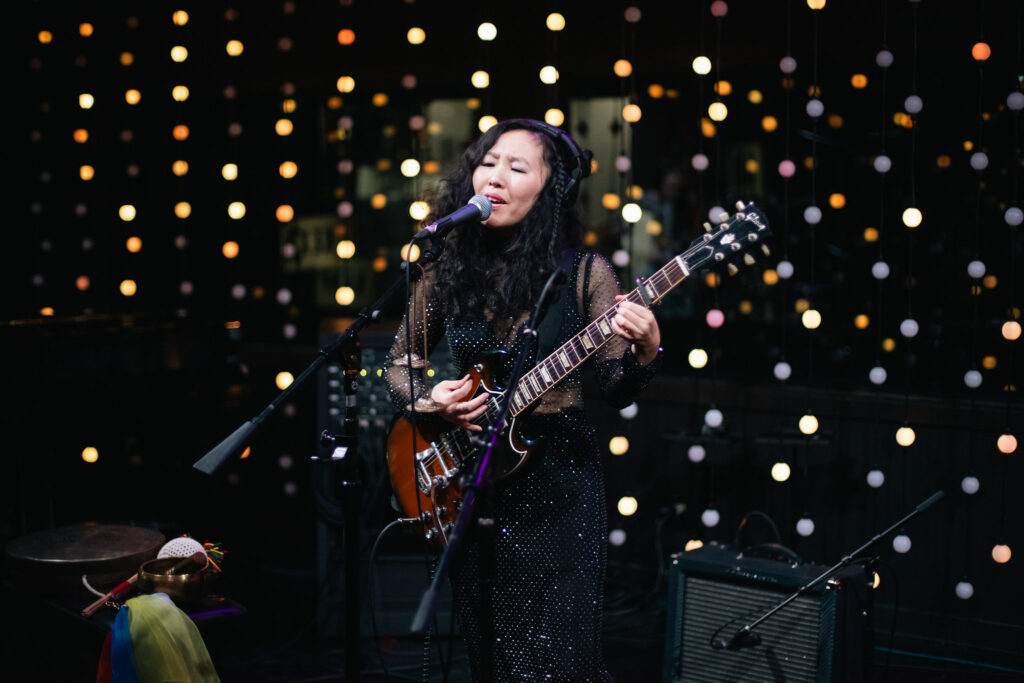By Jia H. Jung, California Local News Fellow
Seattle-based indie music source KEXP employed its first Asian American staff DJ Diana Ratsamee last fall and is rolling out special content for Asian American and Pacific Islander Heritage Month.
On Wednesday, May 1st from 5 a.m. to 7 p.m. Pacific Time, the public broadcaster and arts organization will kick off its Pushing Boundaries program on-air and in person at the Wing Luke Museum of Asian, American, Native Hawaiian, and Pacific Islander art, history, and culture.
Running every May since 2020 with a “not just a month” philosophy, the special schedule will highlight stories from the global Asian and Pasifika diaspora through music, podcasts, performances, and conversations. A new art installation in KEXP’s Gathering Space will accompany this year’s celebration.
Every Thursday throughout May, KEXP will highlight Asian-led groups with 10 of its globally beloved live-taped sessions.
The first artist in the lineup of these filmed studio concerts on Thursday, May 2, is a post-experimental Danish-Korean band from Copenhagen named Meejah (a transliteration of “media,” referring to the artist as a medium for divine inspiration).
The group is helmed by vocalist, main composer, and multi-instrumentalist Mai Soon Young Øvlisen, a Korean adoptee raised in Denmark. Meejah also includes lead guitarist Andreas Isbrandt Løvenskjold, bassist Asger Sørensen, drummer Emil Lake, and musician Daniel Nayberg on live effects and tracks.

Listeners can tune in live on 90.3 FM in Seattle, the recently-purchased 92.7 FM frequency in San Francisco – Bay Area, and on-demand on KEXP’s website. Videos of live-taped sets will drop live on the station’s YouTube channel and remain available for viewing thereafter.
KEXP has grown greatly from its roots as a University of Washington radio station run by student volunteers. The organization employs diversely and frequently conducts programming and community engagement around international Asian and Pasifika musicians and audiences, in addition to elevating other creators usually below the radar of the mainstream music industry.
How Diana Ratsamee became KEXP’s first Asian American DJ
Yet, Diana Ratsamee has the distinction of being the only Asian staff member among the station’s 49 DJs and the first Asian American DJ on staff in KEXP history.
She still cannot believe her position but is starting to see how her whole life prepared her for the job.
Born to Lao refugee parents, Ratsamee grew up playing music with her rock ‘n’ roll musician father and creating and performing music of her own. Before the pandemic, she dove into the world of electronic music and events. She also became more involved in her local neighborhood in the Seattle Chinatown-International District (CID).
The CID was officially protected in the 1980s as a pan-Asian business and cultural district encompassing Chinatown, Japantown, and Little Saigon. Growing up Lao American, Ratsamee always felt connected and welcome there.
Last May, the National Trust for Historic Preservation placed the district on its 2023 list of America’s 11 Most Endangered Historic Places. Ratsamee was part of the tide of younger Asian people reviving the area amid challenges such as increasing homelessness and looming transit development plans.
She was planning and deejaying the free annual summer CID Block Party when she saw the nationwide call for a KEXP deejay to specialize in Asian-created music.
“I saw this as an opportunity to showcase music from people in the Asian community and to give space to artists and musicians who have often not been given this space,” Ratsamee said. She took a leap and sent in her application.
When Ratsamee joined the KEXP team, she received a carte blanche from her colleagues to create Eastern Echoes, a curation of fresh music from the worldwide Asian diaspora at 7-10 p.m. PT every Thursday.
She recently completed the taping of a Beijing band that she found on an expat blog about music that Westerners could not access because of U.S.-China tensions and VPN limitations.
She has found Asian artists from Australia and Germany. Discovered Indigenous folktronica, and Central Asian music out of Mongolia. Fallen in love with Pantayo, an all-girl queer punk Filipina band incorporating kulintang, an ancient form of music originating in Brunei, Indonesia, Malaysia, Southern Philippines, East Timor, played on horizontal rows of gongs and larger, suspended gongs and drums.
During one of her shows, Ratsamee played selections from Queen of Spring (2021), the debut album of Meejah. Music from the concept album paired Nordic melancholia and nautical traditions with the eight trigrams of Korean Taoism: Heaven (☰), Thunder (☳), Mountain (☶), Earth (☷), Wind (☴), Fire (☲), Water (☵), and Lake (☱).
Ratsamee’s audiences responded positively to Meejah’s exploration of transnational identity – themes of allyship, female heritage, mythology, ancestry, loss, and reunification rendered in ambient guitars, soaring vocals, Korean pansori soul singing, shamanistic wailing, grinding hip-hop beats, and the ringing of Tibetan singing bowls.
On the other side of the world, Øvlisen could not believe it when her friend, Jonathan Jacobsen of Seoul-based experimental rock group Tierpark, told her that Ratsamee had played Meejah’s music on the radio. Jacobsen was had moved from Seoul to Seattle last fall and was working on video production for KEXP.
Øvlisen had followed KEXP for so long that she could not remember the first time she tuned into the station’s live sessions. She felt that the intimate format of KEXP’s live-taped concerts created a musician-to-musician experience that let her geek out on musicians’ processes.
Chelsea Wolfe‘s set left a particularly strong impression on Øvlisen as a rare representation of crossover metal music. By this time, Øvlisen had taken to writing secret notes to herself to manifest a live performance with KEXP someday and hiding them inside of her drawers.
Meejah had its first trip to South Korea as a band last summer while Øvlisen revisited the country of her birth and attended a gathering of over 450 global Korean adoptees organized by the International Korean Adoptee Association. The band played a couple of performances around these events and also toured separately in the Seoul indie and rock music junket.
Øvlisen met Jacobsen at this time, right before his move. When Jacobsen told Øvlisen that KEXP was on the hunt for a DJ for Asian programming, she asked him to let her know when KEXP’s call for an Asian music DJ was answered.
Upon learning that KEXP had found Ratsamee and that Ratsamee had aired Meejah on Eastern Echoes, Øvlisen messaged Ratsamee on Instagram and asked flat-out if there was any possibility of setting up a live-taped performance with the station. Ratsamee answered yes.

The band’s experience of getting to Seattle was a literal storm of challenges, followed by mystical convergences. While they would have normally flown through Reykjavik, Iceland, volcanic activity rerouted them through London, where heavy rains delayed their arrival to Seattle by a day.
Consequently, they missed meeting Ratsamee, who had to be in Mexico City but had set everything up to proceed smoothly on Feb. 10, the lunar new year. Helena Soholm, a Seattle-based Korean shaman who had traveled to Denmark with her Danish husband in January and performed a gut ritual honoring gods, spirits, and ancestors with Øvlisen, showed up at the studio. Right before the filming, Soholm gifted Øvlisen with a shaman’s robe made to order from Korea.
Sehee Kim, also from Tierpark, was there with Jacobson to support the performance and loan Øvlisen a jing traditional Korean gong for use in the show.
The performance united various parts of Øvlisen’s identity.
Leading up to the trip, she had noticed Korean bands on KEXP, from Say Sue Me in 2019 to Ak Dan Gwang Chil (ADG7) in 2021 to Boys and Girls Drinking Choir in 2022, and Tengger, introduced by Ratsamee herself in 2023.
She felt like a door could be opening for a performance by Meejah then. At the same time, she was not exactly Korean.
“When you go to Korea, it’s a huge experience, and it’s very meaningful, but you also notice how much you are not one hundred percent Korean,” she said.
And in Denmark, which she called home, the Korean adoptee community was one of the largest Korean, and even Asian, groups in the country. For this reason, she said that she found it quite nice to interact with Korean Americans, Asian Americans, and those who are in the same boat, what she refers to as Western Asian.
Asian entertainment coming out of the U.S. recently fascinated her – for instance, the all-Asian cast of the Netflix show Beef and the leading Korean and Korean American actors in the Oscar-nominated film Past Lives.
“I think that sort of changed things neurologically for me, to be able to see those kinds of films and series, because we’ve just never seen it before in our lifetime,” she said.
Meejah wants to take another trip to Seattle when there’s a live event in the Pacific Northwest or California. Part of why the band is so excited to gain exposure in the U.S. is to stoke collaborations with Western Asians in the entertainment industry.
In the meantime, Meejah is planning a split release this fall with the band Hiraki.
“I always work on my Korean relations and then the Asian American community or Western Asian community and then the north, but sort of the first thing that I’m always keeping in mind is the underground European scene,” Øvlisen said.
She noted that the split releases of long-format singles were a quirk of the European musical underground.

A longer-range project of Øvlisen’s is a new requiem-inspired composition. The piece will include participation by Korean adoptees impacted by patterns of transnational, transracial adoption following the Korean War from 1950-1953.
She is developing the work in step with the movement pressing the South Korean government’s Truth and Reconciliation Committee to investigate human rights violations against vulnerable children. The international call for justice was spurred largely by the Danish Korean Rights Group, led by Korean adoptees living in Denmark.
Just as KEXP has helped Øvlisen share her authentic, complicated, emotional identity as a Western Asian through music, the station has helped Ratsamee grow closer to her Lao roots as an Asian American.
One of her most memorable experiences thus far was when a Vietnamese listener of Eastern Echoes called her and said, “I thought I’d never hear music in my language.” The interaction almost made her cringe because it mirrored her own sentiments so closely.
For example, Ratsamee never thought she’d hear morlum on American radio. Translating to “expert singer,” morlum is a Lao and Thai form of conversational singing to distinct rhythms, often about unrequited love. Its recent derivations have been likened to hip-hop.
She was able to hear the music on American airwaves within her lifetime simply because she was in the position to put it out there. The music was in the language of her parents – a language she was encouraged to abandon in favor of English to survive in the U.S.
“There has always been that sort of disconnect of wanting to connect and be a part of my culture, but also at the same time hiding that to fit in to succeed, to make it, to uplift my family out of poverty,” she said.
Now, she is reckoning with this social upbringing, unlearning and undoing patterns and behaviors that she feels were placed upon folks just trying to survive in a new country and speak its chosen language.
“It’s not just a radio show. It’s not just music. It’s been so much deeper,” she shared in a video interview with AsAmNews, saying that she had not yet had a chance to state publicly how her work was helping her reclaim more of her family’s history.
A few months ago, KEXP was featured in an exhibition of the same Wing Luke Museum that is hosting a special exhibition for Pushing Boundaries. The exhibition was called Music Matters and showcased Asian American musicians.
She said that her parents were proud and amazed. “I remember after taking my parents to that exhibit, the stories just flowed,” she said.
Her parents had always been clipped about their pasts. At most, they made nonchalant references to walking miles to school or swimming across the Mekong River to get to refugee camps in Thailand.
After the exhibition, her father told her that the brothers William and Voradeth Ditthavong, the musicians he listened to as he fled Laos, had inspired him to become a musician. Ratsamee was hearing this for the first time.
Her parents also told her that refugee camps used to pump Lao music full of anti-American, pro-Communist propaganda and play it for the refugees. Non-propagandistic Lao music and American rock had been her father’s escape from an untenable situation.
Ratsamee ran up against old propaganda when she was researching Lao history and Lao music for the Lao new year in mid-April. Because of the oral tradition of Lao culture, she had trouble finding any written documentation or recordings before the 1960s. Content made after the 1960s was rife with propagandist recordings, songs, and messages manufactured by communists in power in the area.
She said that this had been done to keep people in line and in place, but that the Hmong ethnic people in the hills of Laos fleeing to refugee camps across Thailand knew how to communicate between the lines in these recordings.
In 2015, Ratsamee went to Laos for the first time, alone. She felt that she might find a missing piece of herself there. To her surprise, she could conjure up enough of the language to get around. She often heard the phrase mi na khon Lao, bo phen khon Lao – you have the face of a Lao person but you are not Lao.
She has wondered many times since what belonging is.
“My culture right now and my community is my neighborhood. It’s the CID, it’s Chinatown. It’s the other folks who are living in this diasporic experience with me that are doing the work to share the stories,” she said.
On the side of her job, Ratsamee founded SEA Vinyl Society, which preserves old recordings of Southeast Asian and diasporic Asian music and just hosted a Lao and Cambodian New Year event. An archivist in Thailand recently reached out to Ratsamee to discuss new information about old music in Laos.
Zooming back out, Ratsamee constantly ponders what counts as Asian to begin with. What about parts of Russia? Central Asia? Western Asia, amid shifting ideas of Arab nations, Persia, and the Middle East?
“It is weird, you know, being grouped into this category of Asian,” Ratsamee said. “But, do our borders define us as Asian, this collective diasporic experience that we have here?”
She talks frequently with her Indigenous, Native Hawaiian, and Pacific Islander about the lumping together of kaleidoscopically diverse Asian groups and distinct Indigenous groups from across the Pacific Ocean, and the peak celebration of the “AAPI” concept now occurring every May.
She said that conversations about the complexities of being thrown into the same census box were ones KEXP hoped to invite in the upcoming month and beyond.
Ratsamee’s goal as a DJ and show host is to elevate Asian-made music and art. She also wants to speak to the differences of cultures and traditions among many ethnicities and their diasporic variants, while showing what commonalities unite the Asian and Pacific Islander diaspora.
“Geopolitical borders are preventing us from seeing and talking. And so I hope that this show is an opportunity for us to just hear what folks are making the spirit of the sound,” Ratsamee said.

KEXP LIVE-TAPED PERFORMANCE RELEASE SCHEDULE FOR MAY:
- Wednesday, May 1: Drinking Boys and Girls Choir South Korean indie punk band
- Thursday, May 2: Meejah Danish Korean post-experimental band
- Tuesday, May 7: Small Island Big Song music, film, and performing arts project uniting people of the Pacific and Indian oceans
- Thursday, May 9: Elephant Gym sibling-led math and post-rock group from Taiwan
- Wednesday, May 15: Mong Tong Taiwanese psychedelic rock duo
- Thursday, May 16: LAIR soul/funk outfit from Jatiwangi, West Java, Indonesia
- Thursday, May 23: Hatis Noit London-based vocalist from Shiretoko in Hokkaido, Japan
- Friday, May 24: Isabeau Waia’u Walker, an Oregon-based singer-songwriter Wailuku, Maui
- Thursday, May 30: Re-TROS (Rebuilding the Rights of Statues) veteran Chinese post-punk and gothic rock band
- Fridayi, May 31: Otoboke Beaver Kyoto punk rock band
AsAmNews is published by the non-profit, Asian American Media Inc.
We’re now on BlueSky. You can now keep up with the latest AAPI news there and on Instagram, TikTok, Facebook, YouTube and X.
We are supported by generous donations from our readers and by such charitable foundations as the Robert Wood Johnson Foundation.
You can make your tax-deductible donations here via credit card, debit card, Apple Pay, Google Pay, PayPal and Venmo. Stock donations and donations via DAFs are also welcomed.


